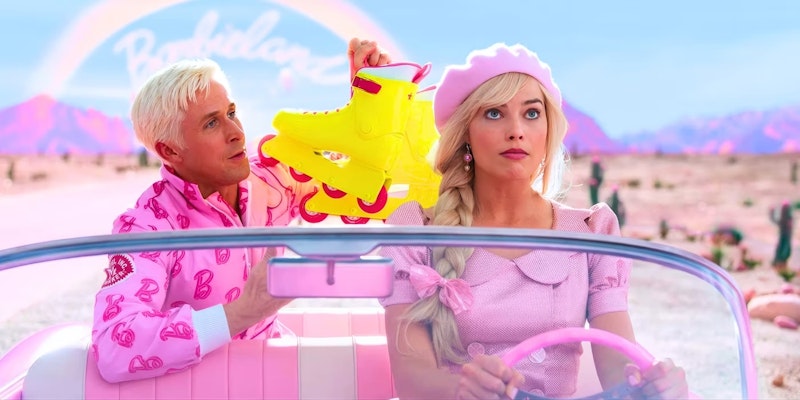Before the WGA and SAG-AFTRA strikes shut down all film and television promotion, Greta Gerwig gave a number of interviews and said Barbie was her “Powell & Pressburger, Jacques Tati movie.” It’s a considerable leap in scope and budget from her previous two features, Ladybird and Little Women, a film that’s been teased for over a year that has somehow managed to hold that buzz for a genuine blockbuster weekend. I went on Friday at The Senator in Baltimore, and it wasn’t just sold out, it was oversold—there were half a dozen people sitting in the aisles. To beat the crush, I got there nearly an hour early, and there were already teenage boys throwing popcorn at each other and running in and out of the theater, along with a row of middle-aged women behind me who kept complaining that Oppenheimer was playing in The Senator’s main theater, an art deco wonder, while Barbie was “stuck” in Theater 2. One of them called out “Patriarchy!”
I’ve been looking forward to Barbie ever since Margot Robbie’s secret Letterboxd was discovered last year: she had an anonymous account with “watchlists” for both Barbie and Babylon. The research films for Damien Chazelle’s beached whale were what you’d expect for something about Classic Hollywood: The Passion of Joan of Arc, Safety Last!, and a few Clara Bow features. But her Barbie homework was intriguing: among musicals by Jacques Demy, Puberty Blues, and Splash was The Truman Show, Peter Weir’s 1998 spin on Philip K. Dick’s Time Out of Joint, where a man played by Jim Carrey gradually realizes he’s the main character of a television show watched around the world.
Barbie’s “twist” might’ve been spoiled over a year ago, but no one suggested that most of the movie would concentrate on “Stereotypical Barbie”’s existential crisis. Everything you’ve seen in the trailers is in the first 20 minutes—usually a good sign. But I couldn’t be more disappointed with this movie: far from proudly serving as a feature-length Mattel commercial, Barbie’s glaring flaw is its script, co-written by Gerwig and Noah Baumbach. Barbie and Ken (Ryan Gosling) leave Barbieland and emerge on Venice Beach, in neon and rollerblades, living out their part of the “humiliating” scene that was widely photographed last year. I agree that the only way to make films as crassly commercial and corporate as this is a metafictional approach; true subversion is impossible at this scale, and the premise of bimbo/himbo duo Barbie and Ken in the real world is a great premise for a movie.
Too bad the script sounds like it was written in January 2017. If I didn’t have an aisle seat, I would’ve been banging my head against the wall: why are people still re-litigating the 2016 election? Barbie fails to synthesize its capitalist critique with its commercial origins, unlike a very similar and far superior film, 2001’s Josie and the Pussycats. Harry Elfont and Deborah Kaplan’s live action take on the Archie characters remains the gold standard for “toy movies” and anything to do with “IP”; it presaged the Wachowski Sisters’ Speed Racer, with VFX shots of Manhattan as a “super city” closer to Tokyo or even Blade Runner, effects that still look great. I saw the movie when it came out, and at eight-years-old, I loved it—the Nirvana jokes and the flavor of the month boyband being named “Du Jour” went right over my head just like the name “Basil Exposition” in Austin Powers, and it wasn’t until this year that I caught one of its many metafictional moments: “Why are you even here?” “I was in the comic.”
Barbie and Josie and the Pussycats are about the same thing: in the “real world,” men in business, law, and politics demean, degrade, and divide women to keep them in place, in the patriarchy. Rachael Leigh Cook’s Josie is brainwashed by their evil manager (Alan Cumming) to ditch her girl power ideals and believe that she’s the real star of the group—by the time she’s heard her record company’s subliminal messaging, she’s full diva, ready to fire and forget bandmates Rosario Dawson and Tara Reid. Evil is thwarted and the last members of the MTV generation are freed from the magic silver box that cooks their CD’s and fills them with commands to buy Snapple, Tide, Starbucks, Red Bull, and on and on and on…
The capitalist critique of Josie and the Pussycats is far more sophisticated and successfully synthesized than the lopsided, heavy-handed Barbie, which I imagine is going to disappoint a lot of young girls. I couldn’t believe how graceless it was, moving from a glorious candy-colored dream world into a boring and incoherent rehash of every piece of liberal media made in response to Donald Trump’s election. Barbie’s arguments aren’t controversial—men rule the world, women suffer silently, and being a human being often sucks. All of this is true, but the film is incapable or unwilling to luxuriate in its most impressive aspects: the production design, sets, costumes, and excellent visual effects, once again recalling 2008’s Speed Racer. Because so much of the movie is spent in the “real world” and then a corrupted Barbieland (called “Kendom”), Gerwig’s visions of Jacques Tati are neglected, and the movie quickly devolves into po-faced lectures about patriarchy, the male gaze, and what it’s like to be a woman. My oversold theater ate up the first 20 minutes—and many jokes thereafter—but more often than not, the air left the room.
You can make a fantasy comedy for kids with these politics without veering off the road—look at Josie and the Pussycats! Solidarity amongst female friends wins out in the end against corporate greed and mass brainwashing. It’s a remarkably similar movie to Barbie, much better, and, shot by Matthew Libatique, just as visually impressive 22 years on.
—Follow Nicky Smith on Twitter: @nickyotissmith

